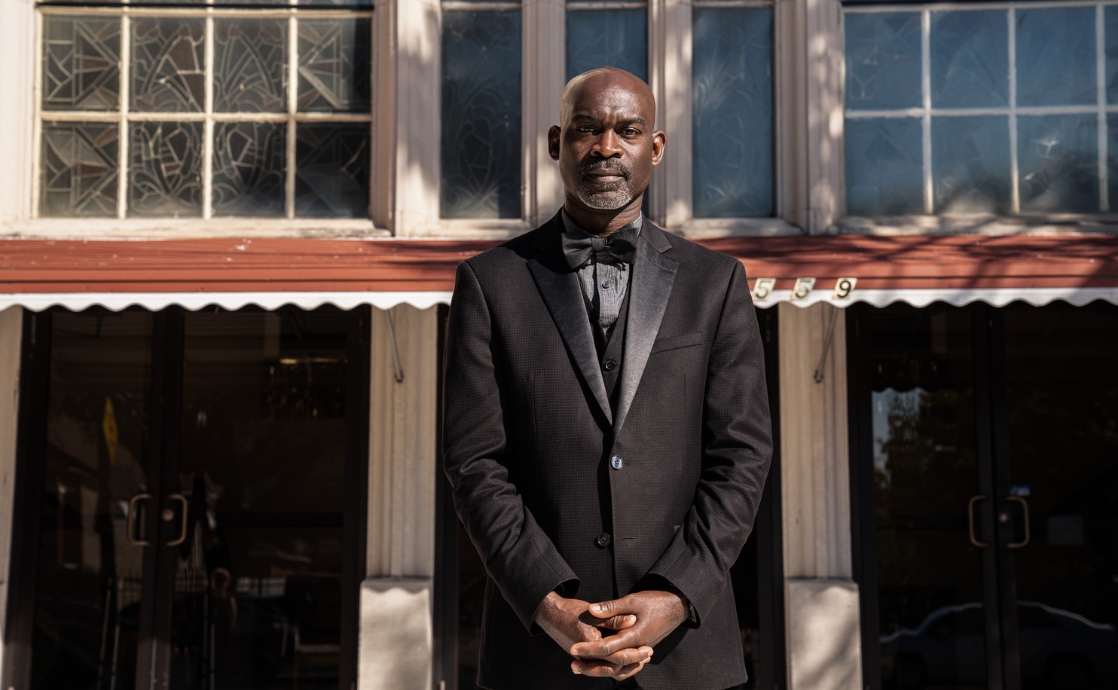The views expressed in our content reflect individual perspectives and do not represent the authoritative views of the Baha'i Faith.
When the prominent Harlem preacher James T. Simpson became a Baha’i and decided to go back to Africa to proclaim his new Faith, Abdu’l-Baha wrote to him and encouraged his endeavor.
The announcement by Rev. James T. Simpson that he wanted to travel to Morocco to spread the Baha’i message apparently was as realistically minded as it was idealistically motivated. Simpson had served as a Christian missionary to Africa a few years before, as previously reported in January 1914 by The Crisis magazine, the official organ of the National Association for the Advancement of Colored People edited by W. E. B. Du Bois:
Miss Eliza Davis, of Texas, a graduate of Seguin College, and Rev. James T. Simpson, of Pennsylvania, a graduate of the theological department of Rochester Seminary and a soldier in the regular army in the Philippine Islands for three years, sailed in December [1913] for Africa as missionaries for the foreign mission board of the national Baptist convention.
Earlier, in the May 1912 and June 1912 editions of The Crisis, W. E. B. Du Bois had published featured articles about Abdu’l-Baha and the Baha’i principles of unity and the eradication of prejudice: “Abdul Baha, The Persian Teacher of Brotherhood,” and “The Brotherhood of Man. An address delivered at the Chicago Conference by ABDUL BAHA of Persia.”
RELATED: From Black Baptist Preacher to Baha’i Teacher
But it is not yet known whether the trip to Morocco ever took place. Three letters (“tablets”) written by Abdu’l-Baha to Rev. Simpson have been located, courtesy of Edward Sevcik, Archivist, on behalf of the National Baha’i Archives of the United States. The first Tablet by Abdu’l-Baha to “Mr. James Simpson,” as translated by Shoghi Effendi, was sent in August of 1919. It reads as follows:
He is God!
O thou servant of God!
Thy letter and poems received. From their contents it became known that, praise be to God, thou art ablaze with the burning fire of the Love of God, hast secured a share and portion from the Bounty of the Spirit, and hast purposed to render a distinguished service to the Divine Kingdom and to be the cause of the promulgation of the Oneness of Mankind.
If it is possible and easy, undertake to travel to North Africa and [enkindle] there the fire of the Love of God and summon the souls to the Revelation of Bahaullah and to the Unity of Mankind, so that religious, racial, sectarian and worldly prejudices may not remain, and all be brought to a full realization of the Truth. If thou goest, assuredly, the confirmations of God shall assist thee.
I pray on your behalf that the Light of Guidance may shine in the hearts, Divine bestowals may be extended and heavily bounty may shine in full radiance.
In this world, whatever thou doest is ultimately fruitless save service to the Kingdom of God and to all Mankind.
Upon thee be greetings and praise.
(Sgd) ABDUL BAHA ABBAS.
Soon afterwards, we know from newspaper reports that Rev. Simpson gave the Sunday evening service at Rev. Bolden’s First Emmanuel Church in Harlem in May of 1920. Later, on Thursday, October 28, 1920, The New York Age reported that Rev. Simpson gave a talk, “How I became a Baha’i,” at the Baha’i Rainbow Circle meeting held at the First Emmanuel Church.
Abdu’l-Baha’s second letter to “Mr. James Thomas Simpson,” from the Louis Gregory papers as translated by Azizu’llah S. Bahadur, dated that December, probably arrived sometime early in 1921:
Mr. James Thomas Simpson, unto him be the Glory of God, the Most Glorious.
℅ Mr. Roy Wilhelm.
He is God!
O thou who art attracted to the Kingdom of God!
Thy letter has been forwarded. It indicated that thou intended to go to Morocco and that also thou married a Bahai lady. This union is a very blessed one …
Convey my great kindness to this revered wife, Caroline! To the Kingdom of God do I pray and supplicate heavenly confirmations for thee so that in this journey thou mayst succeed to such a degree that thou will be astonished.
Unto thee be the Glory of Abha!
Dec. 20, 1920 (sig.) abdu’l Baha abbas
This was followed by a third Tablet from Abdu’l-Baha to Rev. Simpson, dated October 7, 1921 – shortly before Abdu’l-Baha’s passing on November 28, 1921 – as rendered by an unidentified translator:
New York.
To his honor, Mr. James Thomas Simpson.
Upon him be the Glory of God, the Most Glorious.
HE IS GOD!
O thou who art attracted to the Kingdom of God:
Thy letter has been received. Owing to the lack of time I answer in brief. It is my hope that thou wilt soon complete thy studies in law and find a position in the government.
The question of the struggle between the colored and the white is very important, and will be productive of evil consequences in [the] future so that both sides will regret it, unless the wise men of the nation should strive with all their energy to wipe out this hatred and enmity and save the American continent from this great danger. The friends of God must strive with the utmost energy to conciliate both parties together and the Confirmation of the Kingdom of Abha will reach continuously.
Show the utmost kindness on my behalf to thy wife and children and strive thou to keep her contented. Convey my utmost love and kindness to Mr. and Mrs. Gregory, Mrs. Mary Hanford Ford, Miss Catherine Johnson, Mr. Joel Francis, Mr. Richard Bolden, Mr. Eucless, Mrs. Ethel Adams, Mrs. Louise Washington, Miss Silverburg, Miss Regia [or Regine] Sunshine, Mr. Hanko, Mr. and Mrs. Marco Zimm [or Zim] and Miss Anna Van Blarcum. It is my hope that these souls may become the signs of guidance and banners of the Supreme Concourse.
Upon the be greetings and praise.
(Signed) ‘Abdu’l-Baha Abbas
RELATED: Why Do People Have Enmity for Differences in Skin Color?
When read together, these three tablets from Abdu’l-Baha indicate that Rev. Simpson had intended to travel to Morocco (and perhaps elsewhere in the Maghreb region of North Africa), but, in the interim, got married to his second fiancé, Caroline, took care of his four children (by his first wife, who had passed away), then went to law school, with the very practical goal of eventually working in a governmental position.
Many of the names and salutations given at the end of this third tablet reflect Rev. James Simpson’s active involvement in Harlem’s First Emmanuel Church – and within the New York City Baha’i community, as well. At the time, many Baha’is retained their former religious affiliations, and Rev. Simpson – a prominent African American clergyman who became a Baha’i – was no exception.

















Comments
Sign in or create an account
Continue with Googleor